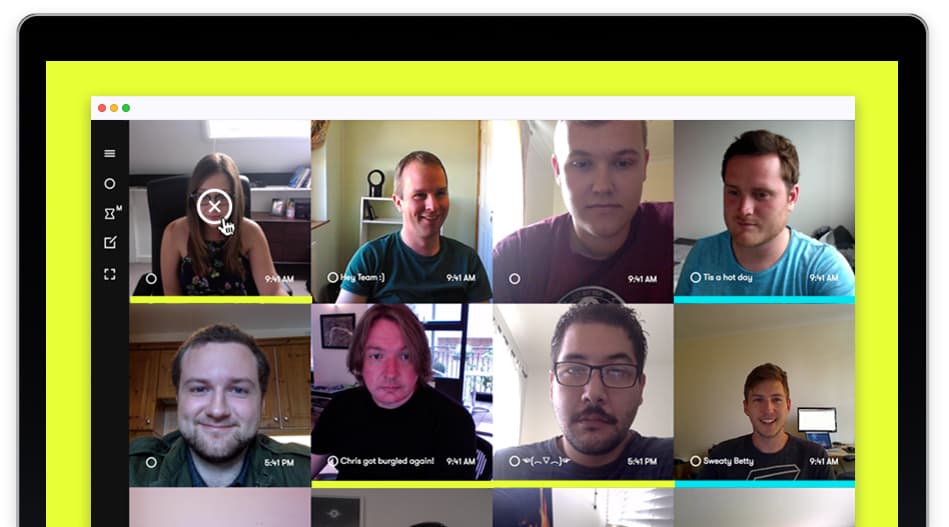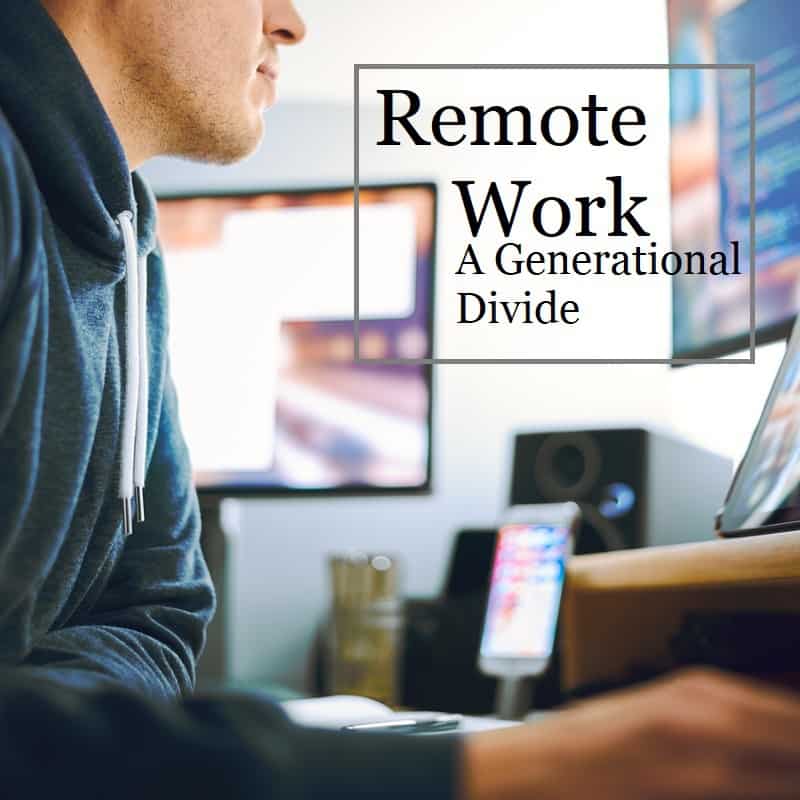Summary:
- We asked our founder and owner, Tammy Klein of Klein HR Solutions about remote work.
- We arrived at the conclusion that there is a generational divide in how employers & managers see remote work.
- We also look at screen addiction & the feasibility of staying on-task in a distracted world.
What does it mean when an employee works remotely?
Remote work generally refers to a work arrangement where the person is regularly offsite. This can include working from home or working while traveling, as in the case of digital nomads.
As we rethink how work is being done, traditional 9-to-5 work may be replaced by an on-demand marketplace of contract-based specialists.
“Remote Workers” Also Called:
- Telecommuters
- Teleworkers
- Remote workers
- Mobile professionals
- iWorkers
- eWorkers
- Web Workers
- Road Warriors
- Digital Nomads

How the flexible work trend got started
Do your kids fight? Do they ever get jealous when one of them has something?
That’s kind of like how the flexible work trend started.
Web developers (especially those in Silicon Valley) had the coveted privilege. Their work kept them at the computer and they didn’t necessarily have to interact with anyone when in the process of building code. It was only a matter of time until the other departments looked around, compared portions, and fearlessly stuck their hand in the cookie jar.
In order to keep the peace, executives then allowed workplace flexibility options. The problem is, everyone else wanted it too; from managers down to interns; everyone’s tastes elevated.
“The number one thing candidates ask for is remote work flexibility.” –Chelsea Willis, recruiter, TEKsystems

Question: Why is Remote Work Becoming More Popular?
Answers:
- Adoption of tablets in schools
- Some commentators predict that by 2020 every student in the United States, across all grades, will have access to a mobile computing device 24/7 (Norris & Soloway, 2015).
- The growing gig economy
- Greater availability of jobs which can be performed on computers
- Focus on short-term projects that can be governed more flexibly
- Greater availability of global talent, available on a reduced cost, and on a per contract-basis
- Workers getting hired “sight unseen.” The Wall Street Journal Reports that some recruiters are hiring candidates without meeting them. After just one phone interview, candidates have been hired into Macy’s, Bath & Body Works, & Boeing Co.
>>In our 20 HR Trends Everyone Will Be Talking About in 2020, we predicted that remote work would increase in popularity.
“Telecommuting: What was once a perk for most companies is becoming quite standard.” – Tammy Klein
Jobs that Can be Performed From Home Have These Traits in Common
- Minimum physical requirements
- Individual control over work pace
- Defined deliverables
- A need for concentration
- A relatively low need for communication
Source: Margrethe H. Olson, New York University
Most jobs that require only a computer and phone are prime candidates for telecommuting positions since both of those devices are common in most households.
Personal Accountability is the driving force behind Remote Work
If goals are being met, do we really care how & when the work is being done? At the end of the day, if you have a motivated worker who holds themselves accountable in the office when the boss is watching AND keeps working when the manager is away, would you not say they have the personal accountability to work from home?
If they do, then why would you deny them the privilege?
We Ask Tammy: How Can we Work from Home Better?

Question: Tammy, do companies still carry a negative stigma of remote workers?
Answer: “It is up to an organization to set forth policies and talk about their culture. Leaders need to lead by example if a remote policy will work or not. Trust, accountability, reliability must be inherent in the organization to get away from the stigma.” -Tammy Klein

Question: How can companies replicate the success of Silicon Valley companies who offer remote work to their employees?
Answer: “Organizations need to understand the best practices in the tech industry and see how remote workers work and why they are successful. Certain jobs, industries just may not be able to offer this.” -Tammy Klein
Question: What are some accountability tools HR departments and managers can use to track work-from-home-performance?
“Open communication and continuous feedback are critical. Setting expectations in advance and periodic check-in are important. I don’t think you always have to see how the employee is completing their job responsibilities-you need to understand the quality of results. Can’t micromanage but can’t also be “out of sight out of mind!” Trust that they are doing their tasks, but also verify through periodic check-ins.” – Tammy Klein
A Divided Workforce
Question: How many companies are starting to adopt this trend?
Answer: “I would think more than 50-60 % of companies have remote workers but probably less than 50 % are ok with it. Companies that are led by a younger leadership team seem to adapt to this better than others.
I think there is a generational gap between the needs of the Millennials versus other generational groups that may be leading companies. Companies like to have people visible in a location to foster collaboration and accountability. Organizations need to determine the type of culture they want to create or be known for.” – Tammy Klein

Fighting Screen Addiction & Trying to Stay Focused
For most Millennials the work domain has completely spilled over into the home domain. Millennials, for the most part, approve of remote work. However, research continues to show that they have trouble balancing work responsibilities with the dopamine rush that is social media.
Simon Sinek found that just having your cellphone on your desk while you work reduced your productivity.
The cognitive dissonance in a remote worker is huge. With so many tabs open, notifications going off, and multiple screens in the home office competing for our attention, it’s a wonder any work gets done at all!
Remote Work: Final Verdict: Here to Stay
If you look around us, you’ll see that remote work is becoming a staple of our society. Some would even argue it is becoming a staple of modern capitalist work modality. The tried and true path still works; research has shown that stuff gets done when people come into the office. Separating work domains with home domains has been a badge of pride for many Traditionalists and Baby Boomers.
However, we tip our hat to the adventurous and curious Gen Y and Gen Z who have managed to make their business revolve around their lifestyle, not vice versa.
New methods are always met with skepticism, so it will take some time until everyone learns proper video calling etiquette.
What we do know for certain is that employees that will thrive in the challenging economy of 2020 will exhibit a do-it-yourself attitude.
Our final tip for project managers is to look to the future and create patchwork teams.
Looking Ahead
Patchwork Teams: Sewing the same company quilt virtually and individually
Globalization is creating patchwork teams. Patchwork teams are diverse, able to speak English (although not natively), and can be contracted on a per-project basis, oftentimes at a lower cost.
For example, companies may elect to have their graphic design team in Bangladesh, but their web development team in Cluj. A home-base team, consisting of a highly paid homebody (a UI/UX designer whom you can meet with in person) may be able to weave the project together.

Good project managers leverage this more than any other tool
Remote work teams that can leverage patchwork teams are poised for success in 2020. When budgets get tight but projects still need to get completed many project managers find themselves working with team-mates 7, 8, or 9 time zones away. The reality for project managers working on digital products is that sometimes you’ll find yourself with a totally warped sleep schedule.
And if you are a project manager, the only tool you really may need is a contact you trust (either in South America Southeast Asia, India, or Eastern Europe – all containing countries with talented developers & marketers who speak English). They may need coaching and familiarity with your brand. They will need hand-holding to adopt your systems, processes, and culture. There most likely will be a process of trial and error.
Most project managers fear such a bold undertaking, but properly executed, the initiative can save companies much-needed capital.
“Telecommuting works best when three ingredients come into play: project clarity, full project control to allow you to own it, and most of all passion for the subject matter.”
>>Read our testimonials to see how Tammy Klein can help make your business a world-class place to work
#telecommuting #telework #remotework #remoteposition #mobileprofessionals #iworkers #eworkers #webworkers #roadwarriors #digitalnomads

